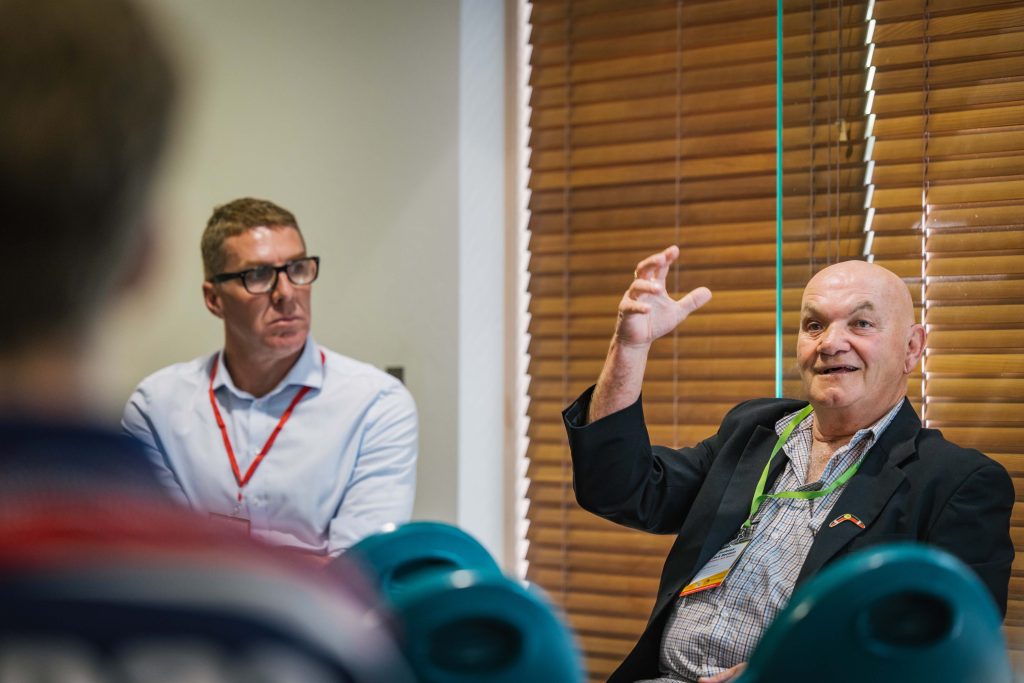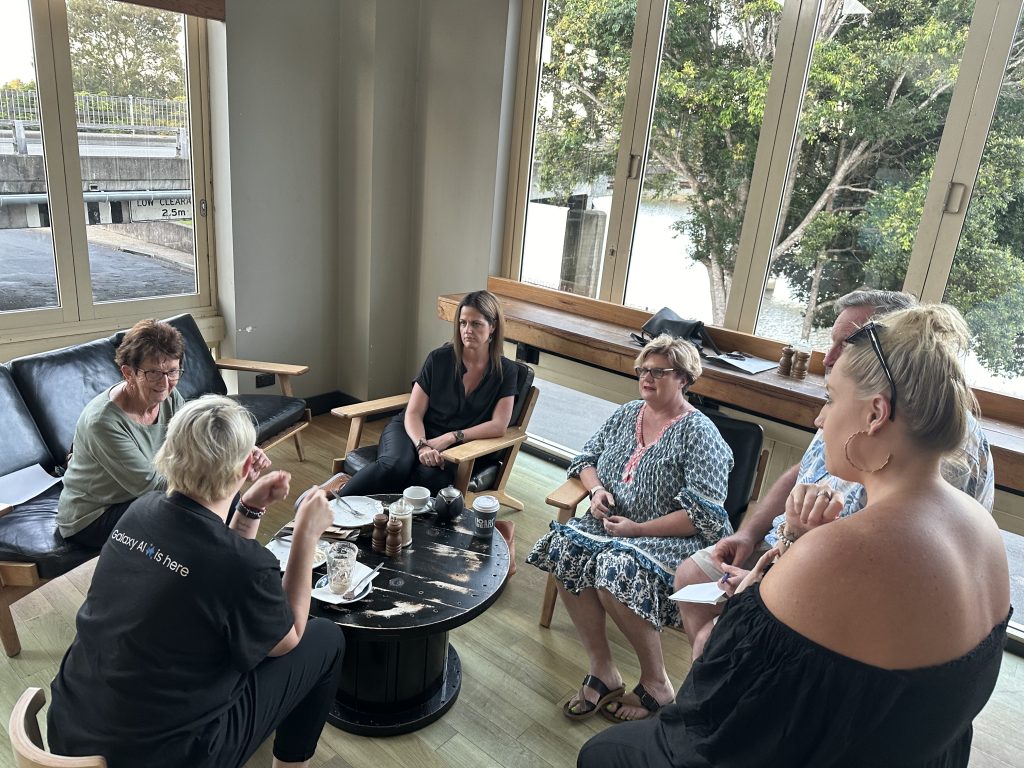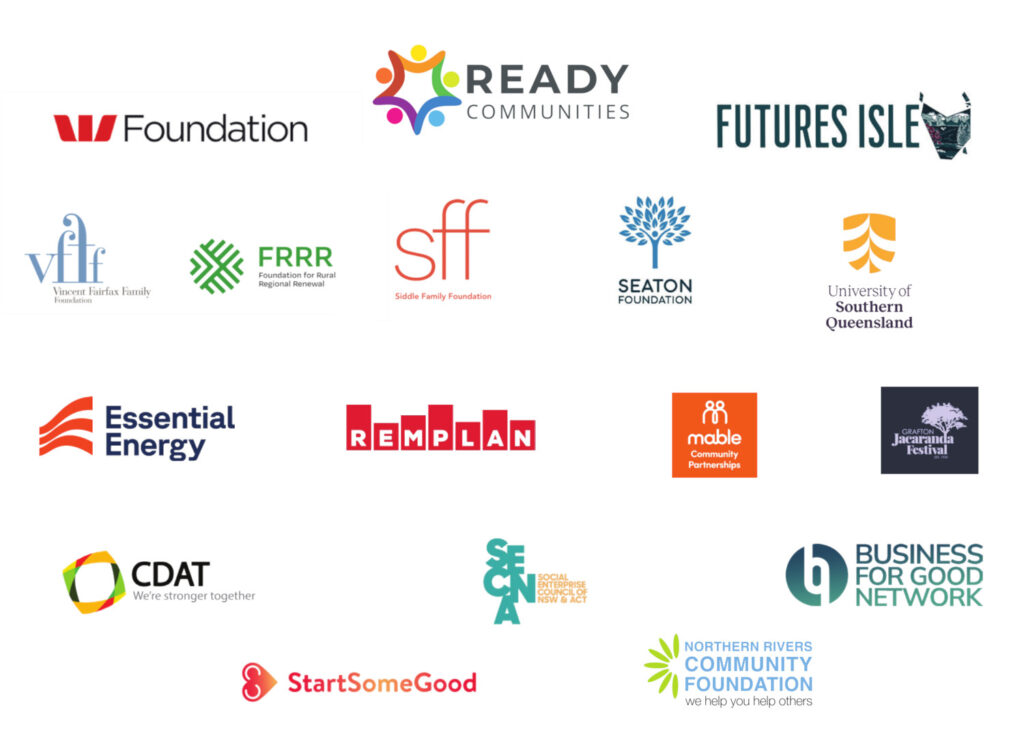What an absolute treat to have our own media team at this year’s SIITR25.
The following post was written by communications specialist and storyteller Justine McClymont who is based on Bundjalung Country in the NSW Northern Rivers.
Social Impact in the Regions 2025 — Day One: Come As You Are
What happens when regional leaders, First Nations voices, philanthropists, impact investors and social changemakers from across Australia come together in one town?
You get a room alive with wisdom, bold ideas and a collective force for change.
This was the atmosphere during the Social Impact in the Regions Conference (SIITR25) held on Gumbaynggirr and Bundjalung Country, as more than 200 people gathered from 3–5 September 2025 in Grafton in the NSW Northern Rivers.
Part conference, part changemaking event, part community activation — with a dash of arts and music festival energy — this event was a powerful catalyst for positive impact across regional Australia.
A Moving Welcome
Day One, themed “Come as You Are” (inspired by Nirvana’s iconic anthem), invited everyone to show up as themselves with authenticity, curiosity and courage.
Marc Daley welcomed attendees to Country with a captivating and moving song honouring his connection to the Bulgarr Ngaru / Clarence River.
Kerry Grace, founder of Ready Communities and the driving force behind the event, officially opened the conference. She was followed by Jesse Taylor, from the SIITR25 Advisory Team, who delivered an inspiring welcome address and call to action, posing the question: “What if regional Australia stopped waiting for permission?”
Panel One: The System’s Story
Guided by Natalie Egleton, CEO of the Foundation for Rural and Regional Renewal, the morning panels explored regional Australia through the lens of place, power and possibility.
The first panel featured Margot Beach (General Manager of the Dusseldorp Forum), Di Kapera (State Director, NSW/ACT, Mission Australia) and Kim Houghton (Strategic Economic Solutions).
They spoke of the need for a shift in mindset, systems and partnerships, where communities are placed at the centre of decision-making.
Natalie stated that rural communities aren’t asking for help; they’re asking for agency and systems that support ongoing efforts.
Margot emphasised that “it’s communities that have the solutions”, while Di added that organisations need to “wait to be invited” into communities.
Kim suggested that central agencies need to rethink their roles, saying “uniformity does not equal equity and equality”. Communities already hold capacity; what’s needed is trust and genuine place-based approaches.
The conversation also highlighted the importance of agile funding. Natalie said, “Money is not held or owned by community. If we changed this, it would change everything.”
Panel Two: The Community’s Call
The second panel featured Jo-Anne Kelly (Partnership Lead, Learning the Macleay), Elly Bird (Executive Director, Resilient Lismore) and Dr Leon Ankersmit (CEO, Caringa Australia).
Each shared real-world insights into how local organisations and communities are leading change — often in the face of systemic barriers.
Elly shared lessons from Resilient Lismore’s disaster recovery, preparedness and resilience work: “They didn’t seek permission … they just lent in and took action.”
Jo-Anne shared the evolving work of Learning the Macleay, a community-led, place-based initiative on Dunghutti Country. She agreed that many communities are feeling “over-consulted”, with engagement processes that are “not telling us anything new”.
Leon reflected that current systems and funding models, particularly in the disability sector, mean that “organisations and individuals who should be working together are pitched against each other”.
Natalie Egleton closed the session by calling on participants to act as a collective force for change, as existing systems are built around competition — which regional communities are too small for.
“Community mobilisation happens in spite of the systems,” she said.
Money Matters: Demystifying the Impact Economy
With $7 trillion in funds under management in Australia — but less than 3% of GDP going to impact investing — the Demystifying the Impact Economy session asked an important question:
How can we better use capital to drive meaningful change?
Elise Parups, Independent Consultant, offered an insight into the impact economy, covering philanthropy, impact investing and the importance of measuring impact. She said that organisations need to match the right capital to the right stage and for the right impact.
Jo Taylor, CEO of the Siddle Family Foundation and Chair of the Pay What It Takes coalition, explained that the coalition is working to create a shift in funding practices that undervalue core operational costs and overheads, such as staff salaries, admin, technology and marketing.
Through advocating for full-cost funding, the coalition aims to help break the non-profit starvation cycle, so that organisations can operate efficiently and deliver lasting impact.
Impact Labs: Active Learning, Local Leadership
In the afternoon, delegates joined one of five Impact Labs, providing a chance to engage directly with Grafton-based practitioners and changemakers.
From social enterprise ecosystem development and main street activation, to food systems, community engagement and youth futures, each Impact Lab explored how community-led, place-based approaches can help shape thriving and resilient regional communities.
These sessions provided people with an opportunity to establish valuable connections, exchange ideas and learn from one another about how regional communities address local challenges, identify opportunities, and develop practical place-based solutions.
This was led in partnership with local impact facilitators from the New School of Arts Neighbourhood House Inc, Clarence Valley Food Inc, Grafton Jacaranda Festival, headspace Grafton, a local faith community and more.
National Pitchfest: Innovation in Action
The first day closed with the SIITR25 National Pitchfest, which showcased five regional changemakers.
Red Dirt Robotics took out the top prize, impressing the judges with their hands-on STEM education programs designed for remote and regional schools. Other finalists included Seed Northern Rivers, Gnarly Neighbours Inc., SHedway and the Child & Family Wellbeing Hub.
Closing Thoughts: Together, We Shift the System
Day One shone a light on the systems that need to change — not just in policy and funding, but in mindset — to empower regional communities to shape their own futures. It’s time to stop waiting for permission.
Justine McClymont is a communications specialist and storyteller based on Bundjalung Country in the NSW Northern Rivers. She works across environment, climate, sustainability and social change, helping good-hearted people and organisations tell better stories to drive positive impact. You can find her at justinemcclymont.com
Featured Image: Marc Daley pic by Jay Black (And The Trees)




